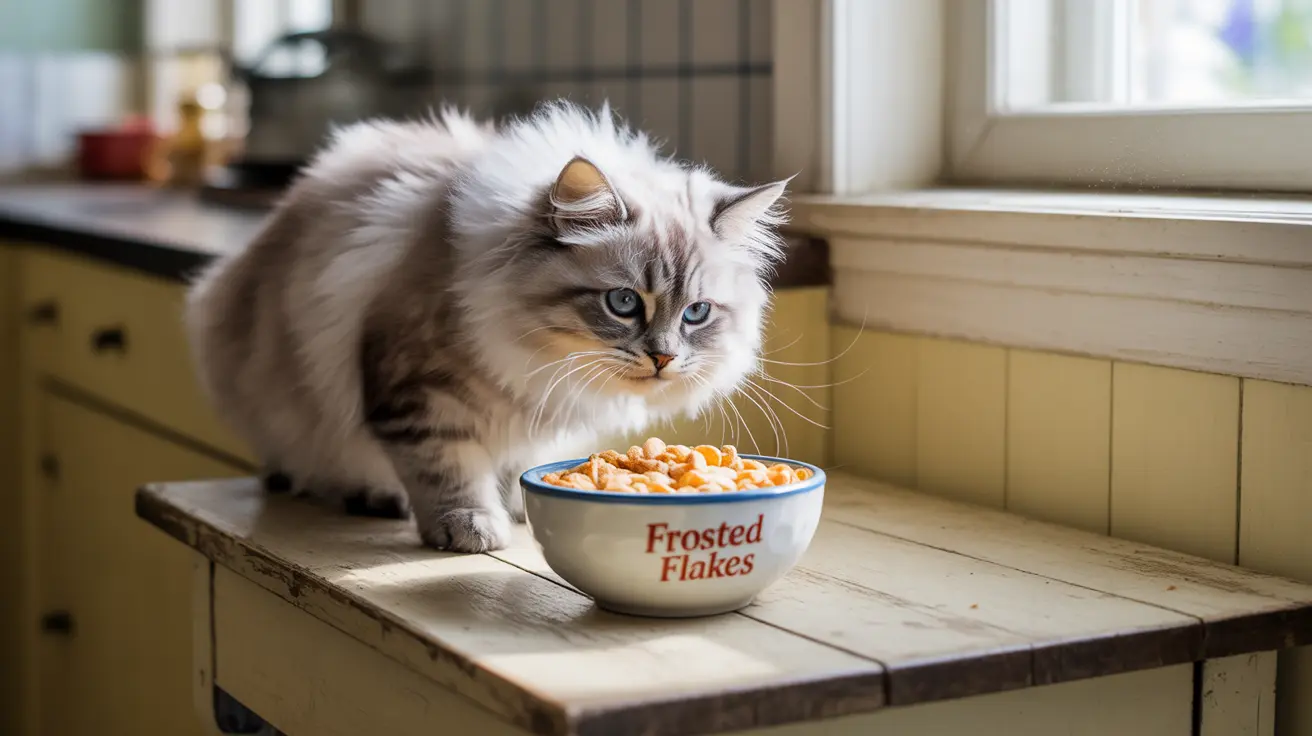Why Frosted Flakes Are Not Suitable for Cats
Frosted Flakes pose several concerns for feline health:
- High sugar content that cats' digestive systems aren't designed to process
- Empty carbohydrates that provide no nutritional value
- Artificial flavors and preservatives that could cause stomach upset
- Risk of dental issues due to sugary coating
The Sugar Problem
Cats lack the ability to taste sweetness, making the sugar in Frosted Flakes completely unnecessary for them. More importantly, regular exposure to sugary foods can lead to obesity, diabetes, and dental problems in cats.
The Cereal and Milk Combination Risk
Many people eat cereal with milk, which introduces another problem. Most adult cats are lactose intolerant, meaning the milk in your cereal bowl could cause:
- Diarrhea
- Vomiting
- Stomach cramps
- Gas and bloating
Healthier Alternatives to Satisfy Your Cat's Curiosity
If your cat seems interested in crunchy textures, consider these veterinarian-approved alternatives:
- Commercial cat treats designed for dental health
- Small pieces of freeze-dried meat treats
- Cat-specific crunchy kibble as occasional treats
What to Do If Your Cat Eats Frosted Flakes
If your cat manages to sneak a few Frosted Flakes, don't panic. Monitor them for any signs of digestive upset, such as:
- Changes in appetite
- Vomiting or diarrhea
- Lethargy or unusual behavior
Contact your veterinarian if you notice any concerning symptoms, especially if your cat has consumed a large amount.
Why Cats Need Species-Appropriate Nutrition
Cats require a diet high in protein and specific nutrients like taurine, which they can only get from animal sources. Feeding them sugary cereals like Frosted Flakes not only fails to meet these needs but can also:
- Displace proper nutrition from their regular diet
- Lead to weight management issues
- Create unhealthy eating habits
- Potentially cause blood sugar fluctuations
Frequently Asked Questions
Can cats safely eat Frosted Flakes or other sugary cereals?
While not toxic, Frosted Flakes and other sugary cereals are not safe or appropriate for cats to eat. They contain high amounts of sugar and carbohydrates that cats' digestive systems aren't designed to process.
What health risks can Frosted Flakes pose to cats if eaten?
Frosted Flakes can lead to obesity, dental problems, diabetes, and digestive upset in cats. The high sugar content and processed ingredients offer no nutritional value and may cause health issues over time.
Why should cats not drink the milk left in a bowl of cereal?
Most adult cats are lactose intolerant, meaning they can't properly digest milk. Drinking cereal milk can cause digestive problems including diarrhea, vomiting, and stomach discomfort.
Are there any cereals that are safe or beneficial for cats to eat?
No cereals are beneficial for cats. As obligate carnivores, cats require meat-based diets and don't need grains or cereals. Stick to specially formulated cat food and treats instead.
What should I do if my cat accidentally eats Frosted Flakes?
If your cat eats a small amount of Frosted Flakes, monitor them for signs of digestive upset. For large amounts or if your cat shows concerning symptoms, contact your veterinarian for guidance.
Conclusion
While Frosted Flakes aren't toxic to cats, they should never be a regular part of your feline's diet. Instead, focus on providing your cat with a balanced, meat-based diet and appropriate treats designed specifically for feline nutrition. Your cat's health will be better for it in the long run.






